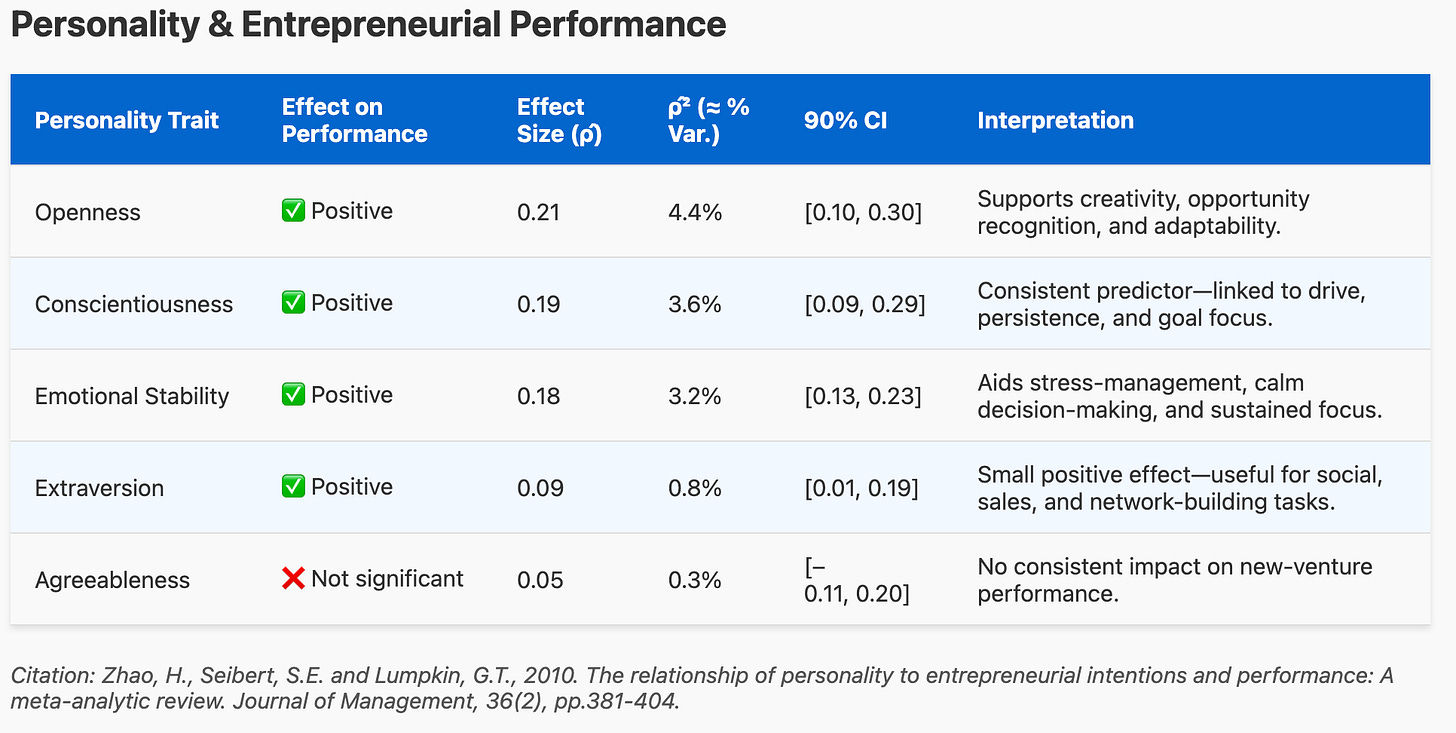Outliers and Mavericks: The Personality Traits of Successful Founders
Does personality predict founder success?
Hi all! This post is about talent and so I wanted to quickly share something relevant.
Ada Ventures is running a hackathon focussed on how we can accelerate prosperity with AI!
The winner gets a £100,000 investment offer plus over £200,000 of cloud services.
If you know any great potential founders, builders, and product talent, share this link with them. https://www.adaventures.com/ai-hackathon. 🚀
Right, back to the newsletter.
If you’re new, a warm welcome & thank you for subscribing! This newsletter shares the best VC wisdom and knowledge curated from investors, researchers, and technologists.
You’re part of 600+ industry insiders who’ve joined along on a journey to mastery & impact!
Can we predict whether a founder will be successful based on their personality? This is the wrong question to ask. Why? Simply put, no amount of personality testing can reliably predict whether a founder or their startup will succeed.
A better question to ask is: What role does personality play in startup success, and just how much can we attribute that success to the personality traits of the founder? These are the questions I’ll answer in this post because they lead us to insights that VCs can practically use when thinking about talent.
The Traits of Great Founders
What comes to mind when you think of successful entrepreneurs? Perhaps it’s the relentless energy, grit, and perseverance embodied by Melanie Perkins, CEO and co-founder of Canva, the multi-billion dollar design software business.
Melanie has all the classic traits of someone who scores high in what psychologists call conscientiousness. This involves the ability to work hard and persist with grit, particularly when driven by a deep intrinsic need for achievement and the motivation to do things well.
You could tell Melanie had these qualities in spades. She pitched Canva to investors for years but was rejected hundreds of times before securing funding. She even flew from her home in Australia to Silicon Valley to meet a specific investor, giving him the impression she would be in the area more generally, even though the trip was made to specifically meet him, as she recalls in a LinkedIn post. Few founders achieve billion-dollar outcomes without this level of determination.
Alternatively, you might picture successful founders as technically talented, innovative, and intellectually curious. Patrick Collison of Stripe is a perfect example. He took a computing course at the University of Limerick when he was eight years old and, by 16, had won Ireland’s Young Scientist of the Year award. Along with his brother John, he built and sold their first startup, Auctomatic, before they turned 20.
At Stripe, the Collison brothers improved their product through hands-on iteration. They personally installed early versions of Stripe on users’ laptops and eagerly observed how it was used so they could get rapid feedback. This approach wasn’t just about hustle. It was an obsession with building products developers love. (An interesting aside: Patrick maintains a diverse list of book recommendations on his website. These range from philosophy and quantum physics to economic theory and urban design, reflecting his wide-ranging intellectual curiosity.)
Another common image of great founders emphasises creativity, charisma, and extraversion. Brian to Chesky, the co-founder and CEO of Airbnb, comes to mind here. He isn’t a technical founder. Instead, he came from an arts and design background. However, Brian’s creativity and openness to unconventional ideas led him to pursue an opportunity that most people thought was crazy. If hotels are fully booked, why not rent a room in someone’s home? Brain and his co-founders embraced the idea, personally meeting hosts and recruiting users door-to-door long before the world accepted their accommodation system.
As the face of the company, Brian has navigated what their investor Sequoia calls ‘crucible moments’. This included the pandemic-induced travel collapse of 2020. At the time, Brian was transparent and communicated often with employees and the public about Airbnb’s situation. This was extraversion at its best and undoubtedly contributed to the company’s resilience and success.
According to research, some of these traits (especially consciousness and openness) are linked to high performance. Yet, when you examine successful founders more closely, the picture is more nuanced. All the founders I’ve described possess textbook strengths. However, they also have quirks, compulsions, or spikes, as labelled by some in the VC industry. These “x-factors”, for lack of a better term, can be incredible assets or destructive liabilities depending on how you wield them.
We’ll return to these quirks later. For now, let’s first consider what the research says about personality and business success.
How much does personality matter in entrepreneurial success?
There are many research papers on the topic, but the most credible I could find is a review that considered 60 independent studies covering 15,000 entrepreneurs. This analysis found that roughly 10% of the variance in entrepreneurial performance can be explained by personality.
I suspect that personal traits play a larger role at a company’s earliest and most uncertain stages, while it is lowest when a business matures and responsibilities are spread across a large management team.
More generally, though, the modest impact of personality traits on startup success makes sense because many other factors play a role. These include market conditions, access to capital, and networks. Put another way, while personality has impact, situational factors often override individual strengths. Even the most driven and visionary founders can fail due to poor market timing and other issues. Success comes not from a single trait but from the complex interplay between personal tendencies and the environment.
There’s another study that’s worth highlighting here. A large-scale analysis of 21,000+ startups found that while traits like openness to adventure and high energy are common among successful founders, there’s no ultimate single “founder-type.” The real advantage comes from team composition.
Having more than one founder is good, but you can go further with diverse personalities that complement each other. In the analysis, teams that combined a visionary “Leader” type (open-minded and emotionally attuned) with two pragmatic, energetic “Developer” types (e.g. product managers or engineers) had more than 2x the odds of a successful exit compared to the average startup. Another effective combination had one disciplined, execution-oriented “Operator” plus two Developer types. This combo also showed more than twice the baseline odds of success.
Interestingly, this study found that personality-based models were five times more predictive of success than industry classifications alone. In other words, personality traits as a variable contributed five times more to the model’s predictive power in the analysis versus checking whether a company was in healthcare, enterprise, or some other industry. However, the analysis doesn’t tell us exactly how much variance in performance can be explained by personality overall, only that it was more predictive relative to industry groupings and other factors.
What personality traits have the most impact?
The attributes that seem to matter the most are conscientiousness and openness. Conscientiousness is about diligent effort. Openness involves creativity and exploring new experiences.
Other attributes such as emotional stability (the opposite of neuroticism–i.e. calm and resilience when things go sideways), extraversion, or agreeableness (how cooperative and conflict-avoidant someone is) have inconsistent effects. They are helpful in some contexts but neutral or even detrimental sometimes.
Below is a summary that quantifies the impact of each trait. It’s from the peer-reviewed research paper I mentioned earlier, which synthesised the findings of dozens of independent studies across thousands of entrepreneurs.
As you can see from the table, conscientiousness and openness are the strongest predictors of performance. They explain 4.4% and 3.6% of the variance in success, respectively. These are small but meaningful influences. In contrast, extraversion and agreeableness barely move the needle.
Back to the Founders & Their X-Factors
Let’s return to Brian Chesky, Melanie Perkins, and Patrick Collison. They all possess qualities that we associate with success: effort, creativity, insight, and everything else celebrated in startup lore. However, each of these iconic founders also has attributes that don't fit neatly into ideal personality models. Traits initially perceived as weaknesses often underpin their achievements.
For example, Brian Chesky is known for his deep emotional engagement. “I have always felt like you should get as emotionally attached to something as possible”, he said in a podcast, explaining that this helps you get more information in decision-making. And so it’s no surprise that during Airbnb’s layoffs in 2020, instead of suppressing his emotions, he channelled them into something greater: empathy and urgency. Brian oversaw the layoffs, reviewing all 2,000 affected names himself, and later wrote a public letter addressing the issue head-on. This level of emotional intensity can be a significant asset but it also presents challenges—just ask anyone who worked for Steve Jobs.
Similarly, Melanie Perkins demonstrated extreme, and perhaps seemingly unproductive, conscientiousness when she delayed Canva’s launch by over a year to perfect the user experience. This decision defied the typical startup mantra of rapidly releasing a MVP. Yet, her meticulous approach ultimately became a defining characteristic of Canva’s high product quality, separating the company in a crowded market.
Patrick Collison doesn’t match the stereotypical extraversion of a charismatic leader. He’s notably humble and thoughtful and considers himself a “misanthropic introvert”. Yet, Collison listens deeply and fosters a collaborative environment at Stripe. His humility extends to regularly inviting customers to Stripe’s management meetings to get honest feedback grounded in user experiences rather than internal assumptions.
These founders illustrate a critical point: successful entrepreneurs often defy predictive models. The insight here isn’t that unusual traits guarantee positive results. However, outlier success happens precisely in areas where neat predictive frameworks break down.
What Does this Mean for VCs?
Personality models have some predictive value and are worth considering. Their modest impact does, however, suggest that we should avoid rigid interpretations. In the right context, traits initially seen as flaws might be exactly what enables exceptional success.
Of course, qualities such as emotional intensity, obsessiveness, introversion, and other extremes can become liabilities if left unchecked. Context matters immensely. So the right thing to do as a VC is to remain open-minded. The best founders rarely fit comfortably into any box. Recognising this fact might be the most important insight of all when it comes to personality and startup success.





